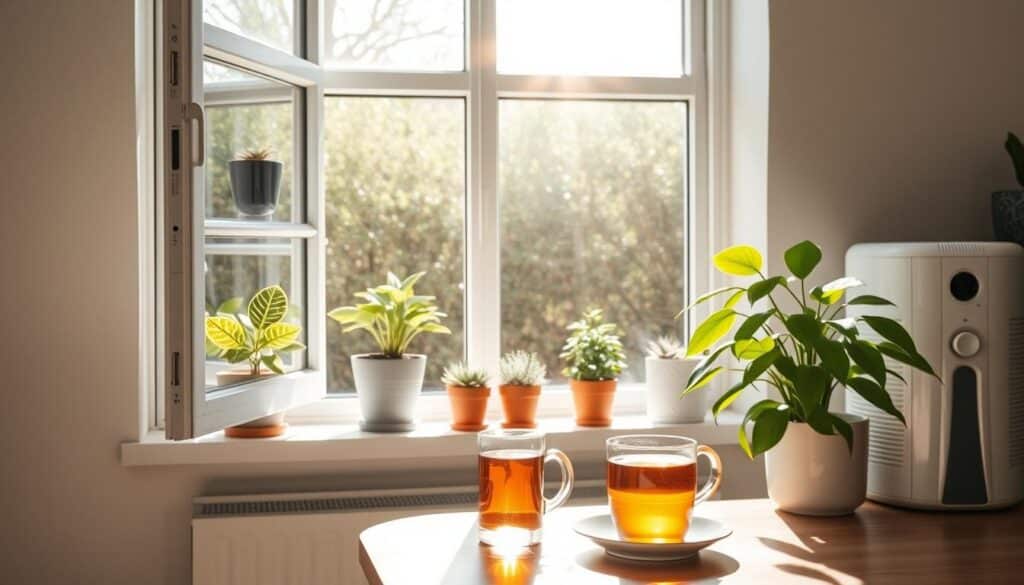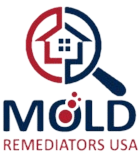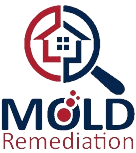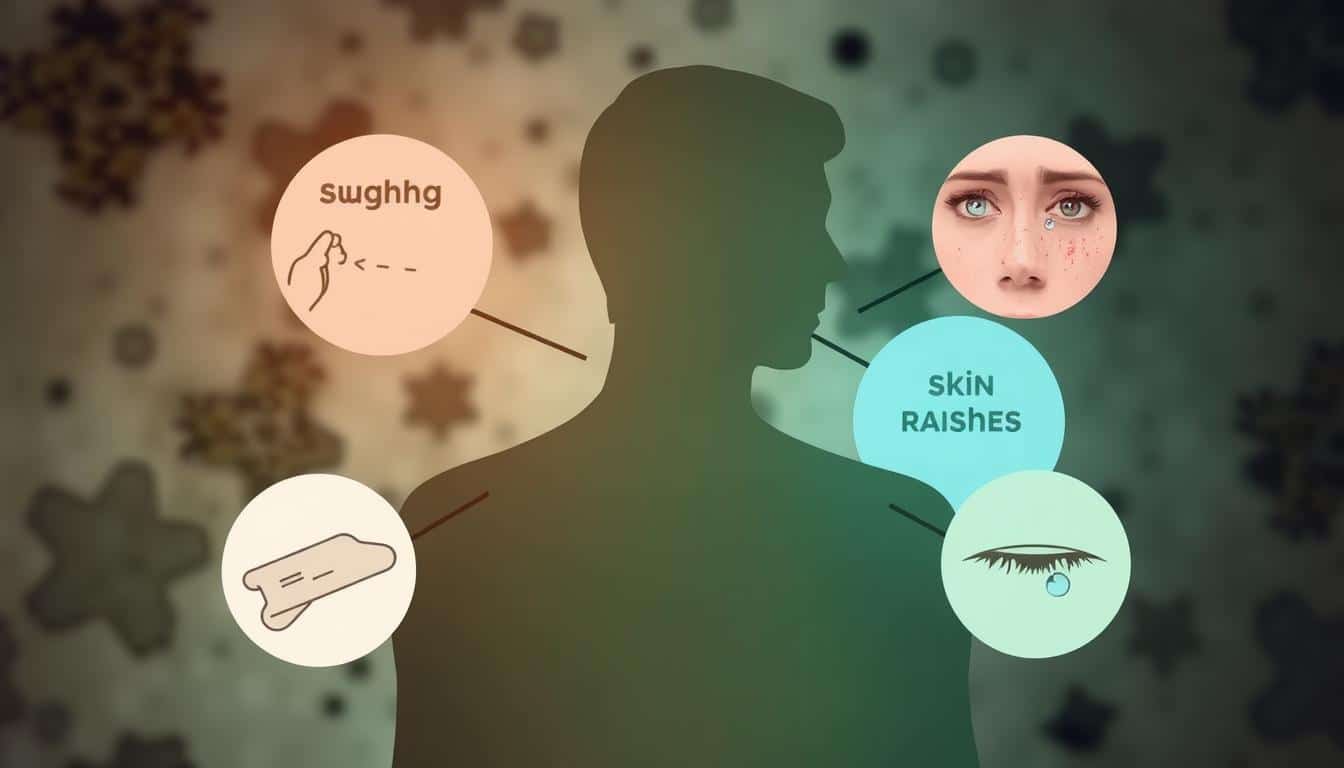Did you know black mold grows on materials like paper, wood, and drywall? It loves warm, damp places like basements and showers. While it’s not usually serious for most, it can be a big problem for those with allergies or weak immune systems.
As someone who’s dealt with mold, I know how important it is to know when to see a doctor. Mold can cause many health issues, from breathing problems to headaches and memory loss. If you think mold is making you sick, see a doctor who knows about mold toxicity.
Key Takeaways
- Mold exposure can lead to a variety of health issues, especially for those with mold allergies or compromised immune systems.
- Symptoms to watch out for include respiratory problems, skin irritation, headaches, and cognitive difficulties.
- Seeking medical attention is crucial if you experience persistent or severe mold-related symptoms.
- A healthcare professional can help determine if mold is the cause and provide appropriate treatment.
- Professional mold remediation may be necessary to address the source of the problem and prevent further exposure.
Understanding Mold Exposure and Its Effects
What is Mold and How Does it Spread?
Mold is a fungus that grows indoors and outdoors, especially in damp places. It releases spores into the air, which people can breathe in. These spores are everywhere and can grow on any moist surface.
Seeing mold or smelling a musty smell are signs it’s growing in your home. This could be due to roof leaks, plumbing problems, or poor drainage.
Factors That Influence Mold Sensitivity and Symptoms
How someone reacts to mold can vary a lot. It depends on their health, age, and how long they’re exposed. Some people might not react at all, while others could have serious allergic or breathing problems.
Mold exposure can make asthma worse and is risky for people with weak immune systems, especially kids.
Mold loves warm, moist places like bathrooms and basements. It grows more in humid areas or where there are humidifiers. If mold covers a lot of porous materials, they might need to be thrown away. But, hard surfaces can usually be cleaned.
“All molds, regardless of color, should be removed from buildings and homes.”
Even though mold testing isn’t usually needed, getting a professional to check and clean is a good idea. This is especially true for those who are allergic or sensitive to mold. Keeping your home dry and clean is key to avoiding mold.
Symptoms of Short-Term Mold Exposure
Being around mold for a short time can cause many uncomfortable symptoms. Look out for nasal and sinus congestion, itchy and watery eyes, and wheezing. You might also cough, have a sore throat, or get skin irritation. These problems can start quickly, often in just hours or days.
Some people are more at risk for serious mold-related health problems. This includes those with mold allergies and people with weakened immune systems. Also, those with lung issues or chronic diseases are more likely to get sick from mold.
For instance, people with asthma or other lung problems might get worse symptoms like fever and chest pain. Those who smoke, drink a lot, or don’t eat well are also more likely to get mold infections.
It’s very important for these high-risk groups to act fast. If they keep being exposed to mold, they could get even sicker. Getting help from mold experts is often needed to fix the problem and keep them healthy.
Mold Allergy Symptoms
People with mold allergies are very sensitive to mold. They can have severe reactions. Symptoms include nasal congestion, itchy and watery eyes, coughing, and skin irritation. In some cases, mold allergies can even cause asthma attacks or more serious conditions.
Managing mold allergies often means using nasal sprays, antihistamines, and decongestants. In very bad cases, allergy shots might be needed. They help the immune system get used to mold and offer long-term relief.

“Prompt mold remediation is critical for vulnerable individuals and those with chronic diseases to prevent further health complications.”
When Should You See a Doctor for Mold Exposure
Persistent or Severe Symptoms Requiring Medical Attention
If you’re dealing with symptoms that won’t go away because of mold, you need to see a doctor. Signs like headaches, breathing problems, skin rashes, and worsening asthma are serious. A doctor can figure out if mold is the problem and treat it.
Tests for mold exposure check for antibodies in your blood. These tests show if mold is making you sick, with results in a week. Skin prick tests also help find out if mold is causing your symptoms.
Doctors might suggest imaging tests like X-rays or CT scans for serious symptoms. Talking to specialists like allergists or environmental medicine experts is key for a proper diagnosis.
Fixing the mold problem is vital to avoid health issues again. Good ventilation, regular upkeep, and controlling humidity can help. If you think you have mold at home, get professional help for safe removal.
Persistent or severe symptoms related to mold exposure should not be ignored. Seeking medical attention can help identify the underlying cause and provide the necessary treatment to improve your health and well-being.”
Long-Term Effects of Chronic Mold Exposure
Being around mold for a long time can harm your health. It can cause breathing problems, tiredness, and even damage to organs. Some molds, like Stachybotrys, can make you sick in your brain and body.
Studies say 25 million Americans have asthma, and mold makes it worse. Also, 70% of homes in the U.S. have mold, which adds to asthma problems. Mold can hurt your memory and brain work, especially if you’re sensitive to it.
Mold can cause serious health issues like breathing problems and skin issues. It can also damage organs and affect your brain. People who are older, young, or already sick are more at risk. It’s important to find and remove mold quickly to keep you healthy.

“Prolonged exposure to toxic mold can lead to severe long-term health issues in individuals, whether or not they are sensitive to mold, making timely and professional removal of mold crucial for health and well-being.”
Addressing Black Mold Concerns
Black mold, or Stachybotrys chartarum, is often seen as dangerous. But, all mold can be harmful. There’s no proof that black mold is more toxic than others.
Black mold can cause serious reactions, especially in those with weak immune systems. But, the health effects depend on how sensitive someone is and how long they’re exposed. It’s not just about the type of mold.
Understanding the Truth About Black Mold
Black mold smells like wet soil and rotting wood. It grows in damp, hidden spots. Exposure can lead to breathing problems like coughing and wheezing. It can also cause headaches, sore throat, and affect the brain.
Children are more at risk because their immune systems are still developing. They can get respiratory issues, skin rashes, allergies, and changes in behavior. People with asthma or weak immune systems are also more likely to get sick from mold.
If symptoms from mold exposure get worse or don’t go away, it’s important to seek help. This is especially true for children, the elderly, and pregnant women. Severe symptoms like memory problems or mood swings need immediate medical care.
“Mold toxins can impact various body areas, including the immune system, cancer occurrence, birth defects, nervous system impairments, and mitochondrial function. Chronic symptoms due to mycotoxins can include headaches, allergies, and autoimmune conditions.”
There are advanced tests to check for mold exposure. Symptoms can look like many other illnesses, like anxiety, autoimmune diseases, and sleep disorders.
Homes near water are more likely to have black mold because of the humidity. Leaks can also lead to mold growth. After flooding or water damage, drying areas quickly can stop mold.
Poor air in places like bathrooms and kitchens is perfect for mold. Excess moisture on windows or walls can also cause mold.
To avoid black mold, make sure your home is well-ventilated and fix leaks fast. While black mold is feared, the real goal is to tackle any mold quickly. This keeps everyone in the home healthy.
How to Recover from Mold Exposure
Recovering from mold exposure begins with cutting down or stopping your contact with mold. This means getting professional help to fix the mold problem. You also need to make your home’s air cleaner and drier. Your doctor might give you medicine, like antihistamines or nasal sprays, to ease your symptoms.
Reducing Mold Exposure and Seeking Treatment
If you’ve been exposed to mold, acting fast is crucial for your health. Here’s what you should do:
- Find and fix the mold source. You might need a pro mold cleanup company for this.
- Make your home’s air better by using HEPA air purifiers, dehumidifiers, and good ventilation.
- Talk to your doctor, who might give you medicine like antihistamines or nasal sprays.
- In some cases, your doctor might suggest allergy shots or other treatments to help you get used to mold allergens.
Getting better from mold exposure takes time, but taking steps to reduce your exposure and getting medical help can help ease your symptoms and improve your health.

“Mold toxicity can cause a wide range of symptoms that are hard to diagnose, so it’s important to work closely with your healthcare provider to identify and address the underlying cause.”
Identifying a Mold Problem in Your Home
Mold can be a big problem in our homes. Knowing the signs of mold growth is key to fixing it. Look out for a musty smell and visible mold to spot a problem.
Signs of Mold Growth and Professional Remediation
A musty smell is a clear sign of mold. This smell comes from the mold releasing compounds that smell bad. You might also see mold, which can be green, black, or white, in damp places like bathrooms.
Other signs include water damage and health issues like coughing or sneezing. If you think you have mold, get a pro to check it out.
Trying to clean up mold yourself can make things worse. It can spread more spores. Professional mold removers have the right tools and know-how to fix the problem safely. They make sure your home is mold-free.
“Mold can lead to a variety of health issues, so it’s crucial to address any signs of mold growth in your home as soon as possible.”
Treating Mold Allergies and Toxicity
For those with mold allergies or suspected toxicity, the first step is to avoid mold. This means using medications to ease symptoms like breathing problems and skin issues. These can be over-the-counter or prescription drugs.
In serious cases, doctors might suggest immunotherapy. This helps the body not overreact to mold. For mold toxicity, a detailed medical check-up and specific treatments are needed to help the body get rid of toxins.
Identifying and Treating Mold Allergies
Mold allergies happen when the immune system overreacts to mold spores. Symptoms include stuffy nose, runny nose, itchy eyes, coughing, and skin problems. Doctors use tests to find mold allergies.
After finding a mold allergy, treatments like antihistamines and nasal sprays can help. In some cases, allergy shots are recommended to make the immune system less reactive.
Addressing Mold Toxicity Concerns
Mold toxicity can cause health issues like brain problems, tiredness, and breathing issues. If you think you have mold toxicity, a detailed medical check-up is needed. Treatments like chelation or glutathione supplements may help detoxify the body.
It’s crucial to work with a doctor who knows about mold-related illnesses. They can create a treatment plan that fits your needs.
“Addressing mold exposure and its associated health issues requires a multifaceted approach that involves both reducing exposure and managing the body’s response.”
Understanding mold-related health issues and getting the right medical care is key. It helps improve health and prevents long-term problems from mold exposure.
Prevention and Maintenance for a Mold-Free Home
Keeping your home mold-free is key for your family’s health. By taking proactive steps, you can stop mold from growing. This makes your home safe and comfortable. Here are some important strategies to follow:
Control Humidity Levels
High humidity helps mold grow. Try to keep indoor humidity below 50%. Use dehumidifiers, fans, and good ventilation to manage moisture.
Address Water Leaks Promptly
Water leaks can quickly cause mold. Check your home for water damage or moisture. Fix leaks and dry out affected areas fast to stop mold.
Maintain Proper Ventilation
Good ventilation helps control humidity and prevent mold. Make sure your kitchen, bathrooms, and other wet areas have strong exhaust fans. Also, open windows and doors to improve air flow and lower humidity.
Regularly Inspect for Mold
Look for mold signs like discoloration, musty smells, or visible mold. If you find mold, get a mold expert to remove it safely.
By following these steps, you can lower mold risk in your home. This keeps your home healthy and mold-free for your family.
| Strategy | Description |
|---|---|
| Humidity Control | Maintain indoor humidity levels below 50% using dehumidifiers, exhaust fans, and proper ventilation. |
| Water Leak Repair | Promptly address and fix any water leaks or moisture issues to prevent mold growth. |
| Ventilation Maintenance | Ensure proper ventilation in high-moisture areas like kitchens and bathrooms to reduce humidity. |
| Regular Mold Inspection | Visually inspect your home for signs of mold and address any issues with professional remediation. |
“Preventing mold growth is essential for maintaining a healthy, comfortable home environment. By taking proactive steps to control humidity, address water leaks, and regularly inspect for mold, you can effectively safeguard your living space.
Conclusion
Mold exposure can harm your health, especially if you have allergies, asthma, or a weak immune system. It’s key to spot and fix mold problems at home. If you keep getting sick from mold, see a doctor right away.
The mold exposure summary shows that mold sensitivity can vary. Symptoms can pop up right away or after a while. You might feel sick in your lungs, get headaches, feel tired, or have skin and eye problems.
Severe cases can lead to memory loss, dizziness, and even serious health issues like liver damage or cancer. To stay healthy, control moisture and stop mold from growing. Get help quickly if you find mold.
By acting fast and using the right methods to fix mold, you can keep your home safe and healthy. Early action and proper cleanup are vital for your health and a better home.
FAQ
When should I see a doctor for mold exposure?
See a doctor if you have ongoing or severe symptoms from mold. This includes headaches, sinus or breathing issues, skin rashes, and worsening asthma. A doctor can check if mold is the cause and treat you.
What are the common symptoms of short-term mold exposure?
Symptoms of short-term mold exposure include nasal and sinus congestion, itchy and watery eyes, wheezing, coughing, sore throat, and skin irritation. These symptoms can start quickly, often within hours or days.
Which groups are at higher risk for mold-related health issues?
People with allergies, asthma, weakened immune systems, or pre-existing respiratory conditions are at higher risk. They may react more severely to mold exposure.
What are the potential long-term effects of chronic mold exposure?
Long-term mold exposure can lead to serious health issues. This includes respiratory symptoms, chronic sinusitis, fatigue, organ damage, and mold allergies or asthma. Exposure to certain molds, like Stachybotrys, can cause neurological symptoms and other serious health problems.
Is black mold more dangerous than other types of mold?
Black mold, or Stachybotrys atra, is thought to be dangerous, but all mold can be harmful. The health effects depend on the individual’s sensitivity and the extent of exposure, not the type of mold.
How can I recover from mold exposure?
To recover from mold exposure, reduce or eliminate your exposure to mold. This may involve professional mold remediation and improving indoor air quality. Your doctor may prescribe medication or recommend allergy shots to help manage symptoms.
How can I identify a mold problem in my home?
Signs of a mold problem include a musty smell, visible mold, water damage, and persistent respiratory or allergy-like symptoms. If you suspect mold, get a professional inspection. Trying to clean up mold yourself can be dangerous.
How can I treat mold allergies or mold toxicity?
For mold allergies or toxicity, the main treatment is reducing exposure and managing symptoms. This may include medications like antihistamines or nasal corticosteroids. In severe cases, your doctor may recommend immunotherapy or other treatments.
How can I prevent mold growth in my home?
To prevent mold, control humidity levels, fix water leaks quickly, use exhaust fans, and regularly check for mold. If you find mold, address it quickly and thoroughly with professional remediation to avoid health risks.




